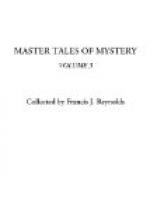“Transmutation,” remarked Prescott, “was, as you know, finally declared to be a scientific absurdity in the eighteenth century. But I may say that it is no longer so regarded. I do not ask you to believe anything until you have seen; all I ask is that you maintain the same open mind which the most progressive scientists of to-day exhibit in regard to the subject.”
Kennedy had seated himself some distance from a curious piece or rather collection of apparatus over which Prescott was working. It consisted of numerous coils and tubes.
“It may seem strange to you, gentlemen,” Prescott proceeded, “that a man who is able to produce gold from, say, copper should be seeking capital from other people. My best answer to that old objection is that I am not seeking capital, as such. The situation with me is simply this. Twice I have applied to the patent office for a patent on my invention. They not only refuse to grant it, but they refuse to consider the application or even to give me a chance to demonstrate my process to them. On the other hand, suppose I try this thing secretly. How can I prevent any one from learning my trade secret, leaving me, and making gold on his own account? Men will desert as fast as I educate them. Think of the economic result of that; it would turn the world topsy-turvy. I am looking for some one who can be trusted to the last limit to join with me, furnish the influence and standing while I furnish the brains and the invention. Either we must get the government interested and sell the invention to it or we must get government protection and special legislation. I am not seeking capital; I am seeking protection. First let me show you something.”
He turned a switch, and a part of the collection of apparatus began to vibrate.
“You are undoubtedly acquainted with the modern theories of matter,” he began, plunging into the explanation of his process. “Starting with the atom, we believe no longer that it is indivisible. Atoms are composed of thousands of ions, as they are called—really little electric charges. Again, you know that we have found that all the elements fall into groups. Each group has certain related atomic weights and properties which can be and have been predicted in advance of the discovery of missing elements in the group. I started with the reasonable assumption that the atom of one element in a group could be modified so as to become the atom of another element in the group, that one group could perhaps be transformed into another, and so on, if only I knew the force that would change the number or modify the vibrations of these ions composing the various atoms.
“Now for years I have been seeking that force or combination of forces that would enable me to produce this change in the elements—raising or lowering them in the scale, so to speak. I have found it. I am not going to tell you or any other man whom you may interest the secret of how it is done until I find some one I can trust as I trust myself. But I am none the less willing that you should see the results. If they are not convincing, then nothing can be.”




